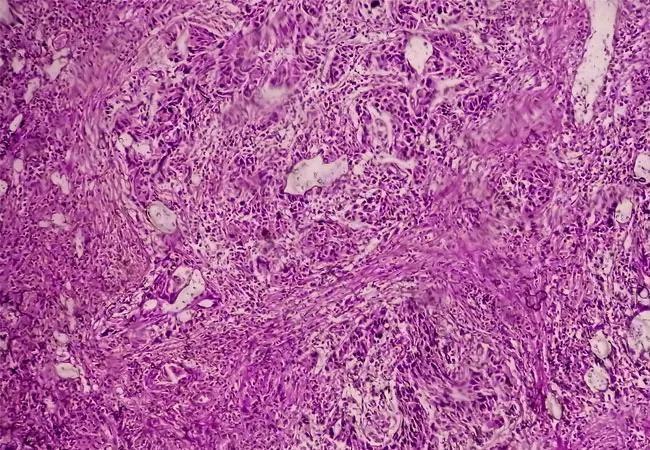Potential treatment option for patients who are ineligible for cisplatin

Enfortumab vedotin (EV), an antibody drug conjugate, combined with the immune checkpoint inhibitor pembrolizumab exhibited durable efficacy with a median overall survival exceeding two years as first-line treatment in a study of patients with cisplatin-ineligible locally advanced or metastatic urothelial carcinoma.
Advertisement
Cleveland Clinic is a non-profit academic medical center. Advertising on our site helps support our mission. We do not endorse non-Cleveland Clinic products or services. Policy
The combination fills an unmet need in the first-line setting, as about half of patients with advanced urothelial cancer are not candidates for cisplatin chemotherapy, says the study’s investigator Shilpa Gupta, MD, Director of Genitourinary Medical Oncology at Cleveland Clinic’s Taussig Cancer Center. The current standard of care for cisplatin-ineligible patients with advanced urothelial is gemcitabine plus carboplatin followed by maintenance therapy with avelumab in patients who do not experience progression after platinum-based chemotherapy. However, a lot of patients do not receive maintenance or subsequent line therapies.
Updated long-term results from the study, known as EV-103, were presented by Dr. Gupta at the 2023 American Society of Clinical Oncology (ASCO) annual meeting.
“Forty percent of patients remained on study after 4 years of follow-up, and 51% of patients are still alive at 4 years,” she says. “The objective response rate by blinded independent central review [BICR] was 73%, and responses were durable, with a median duration of response of 22.1 months. At 2 years, 41% of patients were progression free.”
On April 3, 2023, the U.S. Food and Drug Administration granted accelerated approval to the combination of EV and pembrolizumab in patients with locally advanced or metastatic urothelial carcinoma ineligible for cisplatin, on the basis of three cohorts from EV-103 (two single-arm cohorts and one cohort randomized to EV alone or EV plus pembrolizumab), an open-label phase 1b/2 study.
Advertisement
At ASCO, findings after a median follow-up of 47 months were presented for 45 cisplatin-ineligible patients from a dose escalation cohort (n=5) and an expansion cohort (n=40), all of whom received the EV plus pembrolizumab combination. A creatinine clearance of <60 and ≥30 mL/min was the most common reason that patients were ineligible for cisplatin This criterion was present in 55.6% of the patients. Primary tumor location was the lower tract in two thirds of patients and the upper tract in one third; three fourths of patients had metastases to the lymph nodes, 42.2% to the lungs, 37.8% to intrathoracic/abdominal soft tissue and 31.1% to the liver. Some 84.4% had visceral metastases.
Patients were treated for a median duration of 7 months, with a maximum of 32.9 months. They received a median of 9 cycles of treatment. Progressive disease was the most common reason for treatment discontinuation (42.2%), followed by an adverse event (33.3%). Twenty three of the 45 patients were alive at the 4-year follow-up.
Three fourths (74.1%) of patients were without progressive disease or death at 6 months and 47.0% at 24 months. The median progression-free survival was 12.7 months and the median overall survival was 26.1 months.
There were seven (15.6%) patients with a complete response and 26 (57.8%) with a partial response as best overall response per BICR.
The safety profile for EV plus pembrolizumab was manageable with no new safety concerns observed with approximately 4 years of follow-up. The most frequent grade ≥3 treatment-related adverse events were an increase in lipase (17.8%), maculopapular rash (11.1%) and fatigue (11.1%).
Advertisement
A phase 3 trial, EV-302, which is comparing EV plus pembrolizumab with standard of care chemotherapy (gemcitabine plus cisplatin or carboplatin) in patients with previously untreated locally advanced or metastatic urothelial cancer has been completed, with co-primary endpoints of progression-free survival and overall survival, with results awaited, says Dr. Gupta, who is involved with the EV-302 study. Cleveland Clinic was one of the top accruing sites in the US for EV-302. “If positive for overall survival, this combination will become the new standard as first line in all patients with advanced urothelial carcinoma,” she says.
Advertisement
Advertisement

Enfortumab vedotin plus pembrolizumab benefited patients, regardless of biomarker expression

Treatment involved checkpoint inhibitor, surgery and intravesical therapy

Platinum-eligible phase 3 trial of enfortumab vedotin and pembrolizumab yields ‘unprecedented data’

Enfortumab plus pembrolizumab reduced risk of death by 53% compared with platinum-based chemotherapy

Findings could help with management of a common, dose-limiting side effect

Combining advanced imaging with targeted therapy in prostate cancer and neuroendocrine tumors

Early results show strong clinical benefit rates

The shifting role of cell therapy and steroids in the relapsed/refractory setting